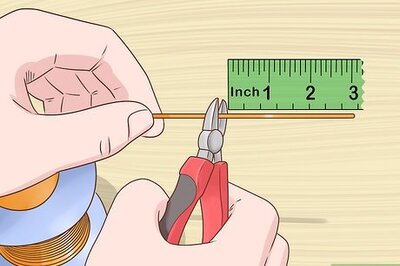
views
X
Research source
Pollutants are hazardous to human and environmental health. So how can you personally clean up the air? You might be surprised to learn how much your efforts can help. Keep reading to learn actions you can take to reduce your contribution.
Rethinking Transportation

Question car culture. Industrial manufacturing practices are the primary reason the earth's air is polluted, but car-related pollution is the next biggest culprit. The manufacturing of cars and roads, the production of fuel, and the emissions that result from burning that fuel all play a part. Since many cities are laid out in such a way that driving is almost a necessity, it can be hard to determine the best way to combat this problem. No matter where you live, you can take action by finding creative ways to be less dependent on cars. It may not be practical to give up your car entirely, but you can still take action by reducing your use of your car. For example, instead of driving to the grocery store every other day, make one trip every week or week and a half, stocking up on everything you need all at once. Carpooling with your neighbors or signing up for a car share program are also great ways to reduce your car use.

Take the bus, subway or train. If you live in New York City you're probably already used to taking mass transit wherever you go, but big cities aren't the only places that offer public transportation. Get familiar with your city or town's bus or train routes, and start replacing your car commute with a bus trip at least once a week. Work up to using public transportation as often as possible, only using your car when you can't figure out a good alternative. Taking a bus or train to work, school or any other activity has a lot of advantages. Aside from doing your part to reduce air pollution, you'll have extra time to read, knit, do crosswords, or people watch. Taking public transportation is also safer than driving, and will probably help reduce your anxiety level since you won't have to deal with rush hour traffic.

Try walking or biking. Even better than taking public transportation is using your own energy to propel you where you want to go. You can probably walk to locations that are within a five minute drive of your house - and if you're adventurous and have the time, you may want to walk even further. If you're lucky enough to live in a place with good bike routes, start using them. In places with heavy traffic, biking can be the fastest way to get around.

Keep your car in good condition. Get your car tuned up frequently and make sure it passes your city's smog test with flying colors. There are a few other things you can do to help your car make as small a dent as possible: Use an energy-conserving motor grade oil. Fill your gas tank in the early morning or late evening, when it's cool outside. This helps prevent as much gas from evaporating in the heat of the day. Take care not to let gas spill when you fill your tank. Instead of letting your car idle in long lines at fast food restaurants and bank drive-thrus, park your car and walk inside. Inflate your car’s tires to the recommended pressure. This will produce the best performance for your car and reduces fuel usage.

Purchase a vehicle carbon offset for your car. You may need to use a passenger vehicle to get around, which releases greenhouse gasses. You can still balance out your car's emissions by purchasing a carbon offset. Carbon offsets typically pay for environmental projects that reduce air pollution to balance out pollutants. Pick a vehicle carbon offset based on your car's fuel economy. You can buy carbon offsets from environmental organizations.
Changing Buying Habits

Make it rather than buy it. Use raw ingredients to make as many things as possible, instead of buying them at the store, is a great way to help reduce air pollution. That's because the practice of mass-producing, packaging, and shipping goods to make them readily available to consumers is directly responsible for industrial emissions that pollute the air. Take a look around your house and figure out items you could make instead of buying. Here are a few ideas: Food, of course! If you tend to buy a lot of pre-packaged food, then making your meals from scratch is a good place to start. Eliminating convenience foods and creating dishes with raw ingredients is healthier and better for the environment. For example, if you love spaghetti, make your sauce from raw tomatoes and garlic rather than buying a can of pre-made sauce. You can make your own pasta, too! Did you know you can make your own household cleaners? Instead of buying dish soap, laundry detergent and bathtub cleaner, make your own using nontoxic ingredients. Store your concoctions in glass jars. The same goes for homemade shampoo, toothpaste, deodorant and lip balm. Clothing is a bit trickier to make on your own, but if you're feeling ambitious and want to give it a try, start with basics like shirts and pants. If you're interested in becoming a full-time maker, look into the art of homesteading. Soon you'll be growing the tomatoes and garlic you need to make that sauce.

Shop locally. When you do need to buy something instead of making it, try to buy items that are made and sold locally. You'll probably have better luck at locally-owned stores, rather than commercial stores, which tend to get their wares shipped in from all over the world, greatly contributing to air pollution. Here are some strategies for buying local: Shop at farmer's markets. This is the best way to shop for food grown and sold locally. Check the tags of clothing items. Try to buy items that were manufactured close to where you live. Though it can be quite expensive, consider buying items that were handmade by someone living close to you. If this isn't an option, getting secondhand clothes is another good way to cut down on consumption. Don't buy stuff online. Getting a book or clothing item online is extremely easy on the consumer's end, but think about the boats, planes and trucks required to deliver that item to your door. It should be something you only do sparingly.

Choose less packaging. The plastic, foil and cardboard used in packaging is manufactured using practices that negatively impact air quality. No matter what you're shopping for, try to choose items that have less packaging. For example, instead of choosing a box of individually-wrapped granola bars, try making your own at home or buying granola bars from a bakery where they don't come wrapped in foil. If that's not an option, go for the items that come in recyclable packaging. Take your own cloth shopping bag to the store instead of choosing paper or plastic. Shop in the bulk food section instead of buying individually packaged items. Buy loose, fresh produce instead of canned or frozen produce. Buy extra large containers of items you use often so you don't have to purchase many smaller containers.

Reuse, recycle, and compost. Managing your household waste effectively is another good way to reduce air pollution. Reusing, recycling and composting can have a big effect on your garbage output, which means less trash going into the landfills - big sources of air pollution. Try to buy items that come in glass containers so you can reuse them over and over again. Plastic is reusable, too, but be careful reusing it too often to store food, since chemicals can leach from the plastic into the food over time. Recycle your plastic, paper, aluminum, and other recyclables according to your city's guidelines. Make a compost pile in your yard, into which you can throw your vegetable peelings and other food scraps. After you've tended your pile for a few months, you'll have rich, black compost you can use to feed your garden.

Use environmentally safe paints and cleaning products whenever possible. Such paints and cleaning products emit less smog-producing particles to the air and are better for your breathing health too. Follow manufacturers’ recommendations to use and properly seal cleaners, paints, and other chemicals. Carefully following the instructions ensures that smog-forming chemicals can’t evaporate.
Conserving Energy

Reduce the use of lights and appliances. You've heard it a million times: turn off the lights when you leave a room, and don't leave the TV on all day! These small actions are more important than ever when it comes to reducing air pollution, since the electricity that runs your lights and appliances is generated by emissions-producing coal or natural gas plants. Here are a few more ideas for cutting back on the energy your household uses on a daily basis: Take advantage of natural light. Set up your work or study space near a window that gets bright light all day, so you won't have to switch the lights on. Have one room in the house be the "bright room" at night, rather than lighting up the whole house all the time. Your family can gather in the brightest room to read, study, or watch a movie before bedtime, rather than spreading out. Unplug your appliances when you aren't using them. That goes for big appliances as well as small ones - TVs, computers, toasters, coffee makers, etc. Even a phone charger left plugged in can sap energy all day long. Replace outdated large appliances with models that are designed to conserve energy. Buy your electricity from low or zero pollution facilities. Look into the options available in your area.

Rethink your heating and cooling habits. Try to allow your body to acclimate to the changing seasons instead of using your heater and air conditioner to keep the temperature steady all year long. Blasting the heat and air is a major drain on energy, so break out your hand fans and warm sweaters to help you adjust to weather changes rather than relying on your thermostat. When you're at work or away on a weekend trip, make sure to adjust your thermostat so that it's not pumping in cool or hot air the entire time you're away.

Don't take long hot showers or baths. Heating water requires a lot of energy, so being mindful of how much hot water you use is an important practice. You can start by taking shorter showers and skipping baths, since both require an abundance of hot water. Turn your water heater to 120 °F (49 °C), so that the water never heats beyond that temperature. Use the cool setting on your washing machine.
Getting Involved

Educate yourself. Different regions have different air pollution issues. There may be a factory nearby that's polluting the air in your city, or perhaps the local landfill is the main culprit in your area. To understand how you can best take action to reduce air pollution in your area, do some research to find out what the major sources are. Look online, read the newspaper, and ask around for information. If you're in school, your teachers might be able to point you in the right direction. Start talking about air pollution with people in your life, instead of glossing over the problem. Discussing the issue could lead to bright ideas or courses of action you wouldn't have thought up on your own. Calculate your carbon footprint here.

Plant trees. Trees reduce air pollution, and planting them is one of the most concrete, satisfying actions you can take to help the air quality in your region. Trees produce oxygen and absorb carbon dioxide, which they turn into food. Find out what types of trees are best to plant in your area, and take action! Many cities have programs geared toward planting trees, like New York's MillionTreesNYC. Find out if there's a similar program where you live. If you can't plant a tree yourself, partner with an environmental organization that can plant trees on your behalf, such as the Carbonfund.org Foundation.

Join a group working to fight air pollution. Individuals can take steps to reduce air pollution in their daily lives, but the ultimate solution will involve changing governmental policies regarding industrial emissions. If you're passionate about taking action to reduce air pollution, consider joining an organization whose goal is to do exactly that. You'll learn more about the education and experience you need to help bring about lasting change and reduce air pollution where you live.




















Comments
0 comment